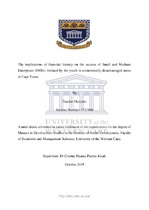The implications of financial literacy on the success of Small and Medium Enterprises (SMEs) initiated by the youth in economically disadvantaged areas of Cape Town.
Abstract
Entrepreneurship has been regarded as a solution to various developmental challenges such as unemployment, inequality, and poverty, which are inherent among the marginalised populations. However, the high rate of failure of Small and Medium Enterprises (SMEs) remain an impediment to the use of entrepreneurship as a means to ameliorate the challenges. This is especially the case among young entrepreneurs. In addition, given the imperativeness of financial literacy in the success of SMEs, this study determines the influences of financial literacy on entrepreneurial success within the marginalised communities. It also explores and identifies the reasons why failure rates are high among young entrepreneurs in the economically disadvantaged community of Khayelitsha, Cape Town.
This study employs a concurrent mixed methods design, making use of both quantitative and qualitative data. A survey is conducted in Khayelitsha using the snowballing sampling technique due to difficulty in accessing young entrepreneurs. The quantitative data from the survey provides demographic and socioeconomic information on young entrepreneurs. The survey is also used to determine the level of financial literacy and business success of these entrepreneurs. The qualitative in-depth interviews, on the other hand, provide insights into the motivations of the entrepreneurs, their experiences and the causes of business failure.

